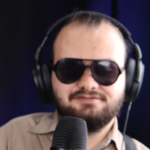Minds of the Movement
An ICNC blog on the people and power of civil resistance
by Ahmad ManninahJune 21, 2024
اللغة العربية
Sign up for the series launch webinar on June 21, 2024.
I became visually impaired two years after my birth due to a genetic disorder resulting from consanguineous marriage. This compelled my family to move to Riyadh in hopes of finding a glimmer of hope for my treatment, which unfortunately did not happen. Nevertheless, my father's work led us to settle in the Saudi capital.
In 2011, multiple revolutions erupted in several Arab countries, including Egypt, Tunisia, Libya, Yemen and my homeland, Syria. Like many of my peers, I became involved in revolutionary activities, advocating for political and social rights. The shock came when boys and girls from my generation, such as Hamza al-Khatib, were martyred. Hamza, born on October 24, 1997, the same year I was born, was forcibly disappeared on April 29, 2011, by the Air Force Intelligence of Bashar al-Assad's regime in the town of al-Jiza while carrying bread and milk with several other young people in an attempt to break the siege on the city of Daraa. His body was returned to his family on May 25, 2011, after he was brutally disfigured and killed by the same security apparatus.
Four days later, on May 29, 2011, Bashar al-Assad's forces targeted a school bus in the village of Rastan in Homs province, resulting in the assassination of Hajar al-Khatib, born in 2000, by indiscriminate gunfire that did not distinguish between young and old. Like Hamza and Hajar, many Syrian children were killed by the cruelty of the Assad regime. Some of them managed to write on school walls phrases like “It will be your turn soon, doctor.”
The martyrdom of Hamza and Hajar was a turning point for me. My imagination would haunt me, seeing myself picking up a bloodstained loaf of bread from Hamza's hands and placing it in Hajar's school bag, carrying it with me wherever I went. I realized that whether I was inside or outside Syria, toppling the regime in Syria would remain my goal, just like millions of other Syrians. So, I worked in the shadows to convey the voices of the oppressed, the groans of the wounded, and to document what was happening in Bashar al-Assad's detention centers.
In 2018, I moved from Riyadh to the Jordanian capital, Amman, to continue my activism without fear of Saudi Arabia's recent policies that restrict political and human rights work, and in anticipation of worsening economic conditions. In Jordan, at that time, civil activism for Syria was more flexible compared to other MENA countries.
In Amman, after getting a BA in Journalism and Media, I refocused on my civic work, doing many humanitarian, awareness and rights projects for people with disabilities and war victims. I worked as a psychological and cognitive supporter for newly disabled people and participated in their psychological, environmental, social and cognitive rehabilitation to make their lives easier and more independent.
It’s not easy being a disabled activist in a society that is always trying to push us away. We live in a part of the world where millions of people are oppressed by a patriarchal society that tries to impose on us who we should be in every aspect of life.
Being a journalist and an activist advocating for the rights of persons with disabilities places the burden of creating a different reality for those who are excluded daily by governments and societies, especially in the MENA region. The challenges faced by persons with disabilities advocating for their rights and human rights, in general, are concentrated on three levels.
The first is the governmental and political level, where there are no strong laws to deter all the violations this group faces. Inclusive policies involving this group in decision-making processes are absent. The second level is societal, where there is a lack of awareness and knowledge about providing a conducive environment for the activism of human rights defenders with disabilities. The third level is the civil society, where organizations and civil society institutions do not focus on this group and their rights and continuously ignore them.
Therefore, it was natural that we, disabled activists, would feel politically and socially excluded, which often makes us underestimate the importance of our activism.
We are exiled and forgotten on the margins of all humanitarian issues, excluded from discussions and decision-making processes, even those concerning our own fates and lives. I wake up every day to prove that as activists with disabilities, we are worthy of life, with rights and duties like any other citizen.
After more than 13 years of activism, a friend of mine called me "the self-made in the shadows," and I am here to say that there are hundreds of self-made men and women in the shadows who dedicate their lives to their causes. Despite continuous neglect and the lack of recognition as active citizens in society, we continue to struggle to create a less grim reality for future generations and to demand the recognition of persons with disabilities as fully-fledged citizens.

Ahmad Manninah
Ahmad Mannina is a Syrian journalist, human rights defender and digital political and human rights content creator. From exile in Jordan, Ahmad focuses his work on the rights of people with disabilities in the MENA region and their inclusion in civic activism. Ahmad also works to raise awareness about sexual and reproductive health and rights.
Read More